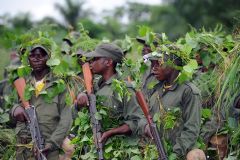Human Rights Voices
While the UN devotes its human rights operations to the demonization of the democratic state of Israel above all others and condemns the United States more often than the vast majority of non-democracies around the world, the voices of real victims around the world must be heard.
Other terrorists, May 27, 2020
Forty villagers killed in Islamist massacre in northeast Congo
Original source
Suspected Islamist militants have killed at least 40 people in northeastern Congo, a rights group said on Wednesday, the latest in a wave of attacks against civilians in the mountainous jungles near the Ugandan border.
Fighters from the Allied Democratic Forces (ADF) group, which was driven out of Uganda in the late 1990s, attacked Samboko village around 100 km (60 miles) southwest of the city of Bunia, early on Tuesday, said Omar Kavota from rights group CEPADHO.
They killed at least 40 people with machetes and looted food and valuables, Kavota added, a day after killing at least 17 in the nearby village of Makutano.
More than 400 people have been killed in attacks attributed to the ADF since the army began an offensive to oust the group from its bases last year, according to the Kivu Security Tracker (KST), a research initiative that maps unrest in the region.
Following two months of relative quiet, the area has seen a rise in deadly attacks in the last three weeks, KST said.
Rachel Tarwayo, a government administrator, said she was aware of the Samboko incursion but could not provide any further details.
"On the ground some people have fled and others have given themselves the courage to stay for the moment," said Gili Gotabo, a rights activist in the region.
While the insurgents have pledged allegiance to Islamic State and the group has endorsed some attacks by the ADF, researchers say there is no evidence of close collaboration.
Some 200,000 people have fled their homes in Ituri province, where the two villages are located, in the past two months due to an uptick of more widespread violence by a variety of armed groups that is hampering efforts to stamp out an Ebola epidemic.
Researchers and rights groups say some Congolese soldiers have also participated in massacres since 2014 for a variety of motives often related to competition for power in lawless zones dominated by dozens of militia groups.

